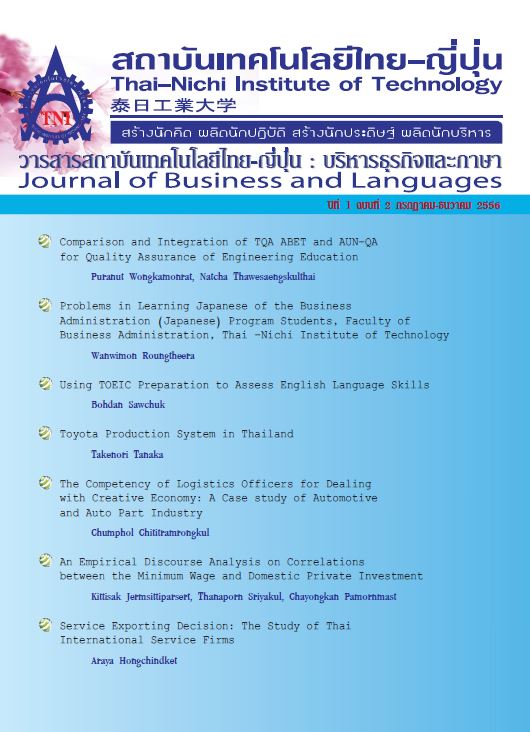Problem Based Learning in Power System Analysis Course: a Case Study
Main Article Content
Abstract
Problem based learning (PBL) is known as an innovative method that improves students in their learning aptitudes. However, PBL is still challenge to power system analysis course since it concerns with advance mathematics and complex methodology. However, two requirements have put a demand in developing the learning method: the first one is to improve students in five skills according to Thai Qualifications Framework (TQF) and the second one is to prepare students for ASEAN Economic Community (AEC) beyond 2015. Thus, PBL has been implemented for the first time in Department of Electrical Engineering, Dhurakij Pundit University and applied to the last year students. The objectives are to develop both students and lecturer. Students should improve their learning aptitudes, ability to integrate their knowledge, and personalities: communication, problem-solving skill, responsibility, and teamwork. The lecturer should develop herself to be a facilitator rather than transmitting knowledge and providing only course materials. The implementation was planned carefully. The objectives of PBL and the corresponding evaluation indexes were set clearly. Then, PBL was carried out corresponding to the subprocedure planned. Finally, evaluation, student feedback and results were analysed and concluded. This paper presents the implementing process, learning outcomes, problems and experiences of implementation.
Article Details
Article Accepting Policy
The editorial board of Thai-Nichi Institute of Technology is pleased to receive articles from lecturers and experts in the fields of business administration, languages, engineering and technology written in Thai or English. The academic work submitted for publication must not be published in any other publication before and must not be under consideration of other journal submissions. Therefore, those interested in participating in the dissemination of work and knowledge can submit their article to the editorial board for further submission to the screening committee to consider publishing in the journal. The articles that can be published include solely research articles. Interested persons can prepare their articles by reviewing recommendations for article authors.
Copyright infringement is solely the responsibility of the author(s) of the article. Articles that have been published must be screened and reviewed for quality from qualified experts approved by the editorial board.
The text that appears within each article published in this research journal is a personal opinion of each author, nothing related to Thai-Nichi Institute of Technology, and other faculty members in the institution in any way. Responsibilities and accuracy for the content of each article are owned by each author. If there is any mistake, each author will be responsible for his/her own article(s).
The editorial board reserves the right not to bring any content, views or comments of articles in the Journal of Thai-Nichi Institute of Technology to publish before receiving permission from the authorized author(s) in writing. The published work is the copyright of the Journal of Thai-Nichi Institute of Technology.
References
R. Donnelly and M. Fitzmaurice, “Collaborative Project–Based Learning and Problem-Based Learning in Higher education: A consideration of a Tutor and Student Roles in Vogel, Learner-Focused Strategies,” [Online]. Available: https://www.aishe.org/readins/2005-1/
Office of the Higher Education Commission, “National Qualifications Framework for Higher Education in Thailand,” Implementation Handbook, Available: https://www.mua.go.th/users/tqfhed/news/FilesNews/FilesNews8/NQF-HEd.pdf, 2006.
L. Low, ASEAN Economic Co-operation and Challenges: Southeast Asia Background Series No. 2, Institute of Southeast Asian Studies, Singapore: ISEAS Publications, 2004.
S. Pitsuwan, “Strategy for entering AEC ” Available: https://www.youtube.com/watch?v=GoWoe5BBDus, 2012.
P. D. Feden and R, M. Method of Teaching: Applying Cognitive Science to Promote Student Learning, McGraw-Hill Higher Education, New York, 2003
J. W. Santrock, Educational Psychology, Classroom Update: Preparing for PraxisTM and Practice, 2nd Edition, McGraw-Hill Higher Education, New York, 2006.
N. Hosseinzadeh and M. R. Hesamzadeh, ‘A Course in Power System Analysis based on Project Based Learning Methodology,’ Available : https://researchbank.swinburne.edu.au/source1, 2010


